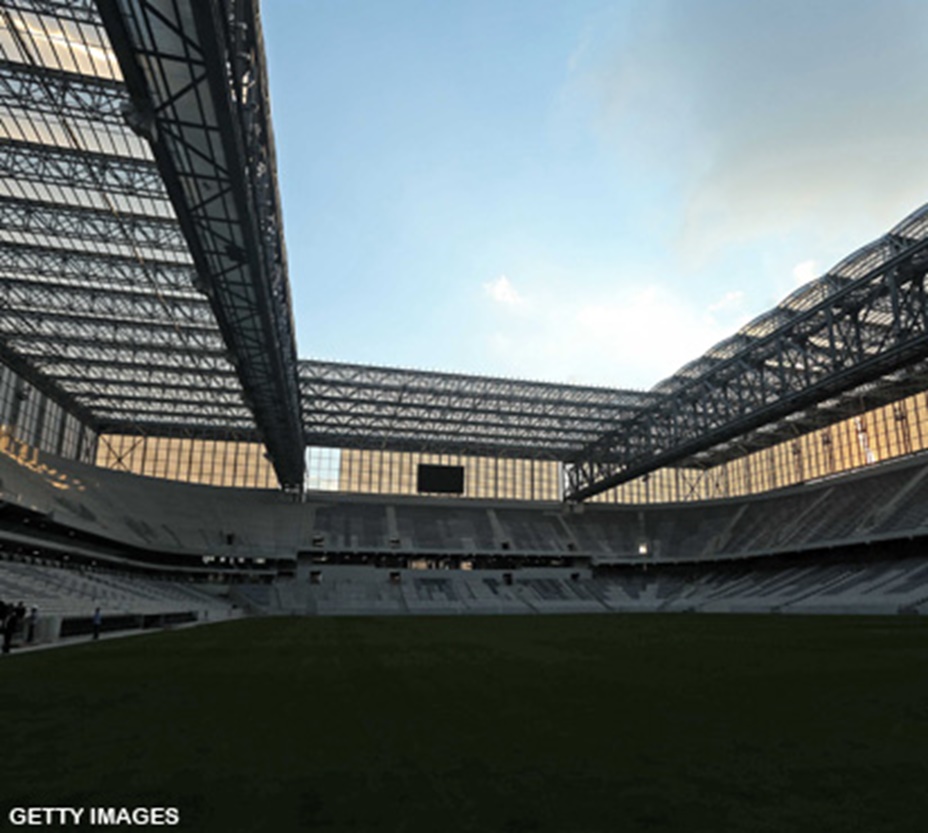The cost of building Brasilia's World Cup stadium "has nearly tripled" to $900M in public funds, largely due to "allegedly fraudulent billing," according to Bradley Brooks of the AP. The spike in costs "has made it the world's second-most expensive soccer arena, even though the city has no major professional team." Mane Garrincha stadium "has become the costliest project" related to Brazil's $11.5B World Cup. Critics "call it the poster child for out-of-control spending and mismanagement, or worse." An analysis of data from Brazil's top electoral court shows "skyrocketing campaign contributions by the very companies involved in the most Cup projects." The lead builder of Brasilia's stadium "increased its political donations 500-fold in the most recent election." The financial links between construction firms and politicians "add to deep suspicions among Brazilians that preparations for soccer's premier event beginning next month are tainted by corruption." Brasilia Audit Court arbiter Renato Rainha said, "These donations are making corruption in this country even worse and making it increasingly difficult to fight." In the 140-page report, the auditors found $275M "in alleged price-gouging and they have only examined three-fourths of the project." They forecast that "fully one-third of the stadium's cost may be attributable to overpricing, the largest single chunk" of $500M (AP, 5/13). In N.Y., Paulo Trevisani noted Rainha said, "Price overruns are either a gross error or bad faith." Local officials "dispute those allegations." Federal prosecutors "have filed no charges or lawsuits." It has "fueled resentment among some Brazilians." Rainha: "We could have spent less on the stadium and invested money in fundamental areas such as public health and schools." Seven World Cup matches will be played in Brasília in June and July, but after that "filling up the stadium will be more of a challenge." Local lawmaker Eliana Pedrosa said, "We are surprised with its costs. Brasília could do with a stadium half as big" (WALL STREET JOURNAL, 5/12).
WORK TO BE DONE: The AP also reported there is a "lot yet to be done." There are three stadiums "still under construction, some of the temporary structures needed for matches are delayed, and it remains unclear if all cities will have time to organize the fanfests required by FIFA." It is already known that "not all infrastructure work will be completed no matter how much organizers rush ahead of the June 12 opener." The government admits that communications inside stadiums "won't be perfect, unfinished airports remain a concern and there are widespread threats of violent protests by Brazilians complaining about the billions of dollars spent to organize the tournament." Brazilian officials "guarantee everything will be fine." FIFA "remains concerned" (AP, 5/13). REUTERS' Tales Azzoni reported Brazil social/political analyst Sean Burges said that there "were always going to be problems, but having visited the country recently, he had no doubt it would deliver." Burges: ''This is not to say it won't be a little messy around the edges, accommodation is going to be expensive, transportation is going to be slow. But what you have to keep in mind is when you choose to put events like the Olympics or the World Cup in developing nations, you're not going to Switzerland.'' Brazil "was one of the world's rising economic powers, and over the past decade it had made major strides in its efforts to raise millions out of poverty." This advancement, Burges said, meant that "more people were now in a position to hold the government to account." Burges: ''You've had 35 million people or so come from dirt poverty up to the middle class in the last 10 years and part of what comes with that is people stop accepting the empty answers they're getting and demand responsiveness." Making things "more interesting" is that '14 is an election year for Brazil. Late preparations for the World Cup "have already embarrassed the country," while those for the 2016 Rio Olympics were slammed by IOC VP John Coates as ''the worst'' he has seen. Brazilian President Dilma Rousseff "has unsurprisingly suffered in the polls as a result." But one thing that "may ultimately save people's reputations and political careers is if the host nation wins the World Cup, as they're favoured to do, and in the ensuing wave of euphoria all is forgiven." Burges: ''President Dilma is falling like a stone in the polls and if Brazil doesn't do well in the World Cup I think she's in serious political trouble'' (REUTERS, 5/13).
TOURISM OFFENSIVE: The AFP reported Brazil on Monday "launched a new international tourism campaign designed to reach more than a billion people, insisting expected anti-Cup protests will not spoil the show." Brazil Tourism Minister Vinicius Lages said, "We have a unique brand of hospitality" in a country which can afford tourists the "visit of a lifetime." The campaign will use the World Cup and the 2016 Rio Olympics "as springboards to long-term tourism growth in a continent-sized country which welcomed six million foreign visitors overall" in '13. Although protests at the event`s $11B price tag "have marred Cup preparations," Embratur's promotional video launch portrays Brazil as "the land of happiness" (AFP, 5/13).




